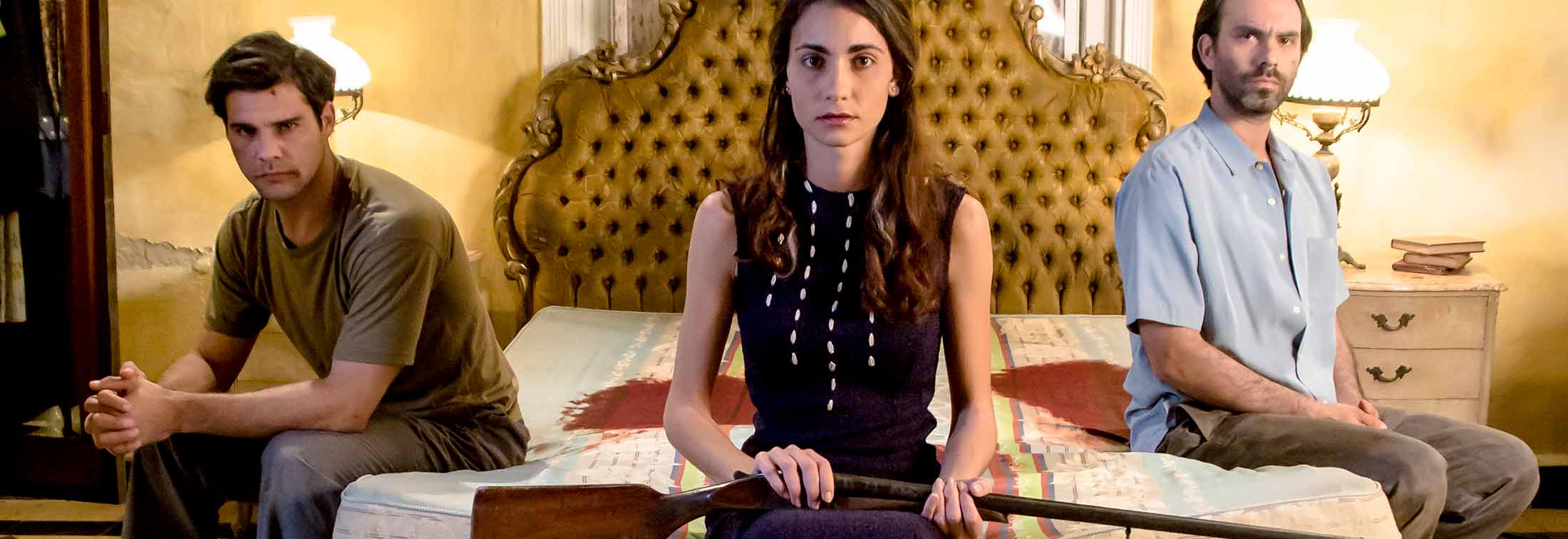
Director Arturo Sotto (‘Vertical Love’) has discovered the police procedural, and it's a perfect fit for his carefully interwoven storytelling. ‘Mantis Nest’ opens with a rainy night in Siboney, "a town in the middle of nowhere." Three gunshots ring out. A rifle lays propped against the wall of a house.
Elena (a versatile and emotive Yara Massiel), Emilio (Caleb Casas) and Tomás (Armando Miguel Gómez) have been involved in a ménage à trois in the small Cuban village for 40 years. One morning in the summer of August 1994, during the migratory crisis with the United States, the trio is found dead in bed together.
"A self-confessed cuckold got tired of being the town laughingstock," sighs horny public prosecutor Fernando Montenegro (Patricio Wood). Upon arrival in the town, he finds that the crime scene has been contaminated due to the clumsiness of Belarmino Fernandez, the local sugar mill administrator and president of the People’s Council.
The prime suspect is Azucar or "Sugar", a twenty-year-old woman who is the product of the love triangle, and who was the only person in the house at the time. She accuses her mother of committing murder-suicide, while the religious townspeople (who could be straight out of Giuseppe Tornatore’s 'Malèna') hurl Christian diatribes outside. To prove her own innocence, Azucar tells Montenegro and her defence attorney Patricia Mejías (Claudia Alvarz) the emotional story of her mother’s life with her two lovers in the midst of the Revolution.
'MANTIS NEST' TRAILER
"If I were an insect, I’d like to be a praying mantis - they are impressive, because when a female wants to procreate, they secrete a hormone attracting a male. I imagine them as a bit hypnotic, because while males do their stuff, females slowly eat their heads," Mejías muses as she tries to puzzle out how sex turned into a triple homicide.
Beautifully composed black-and-white flashback sequences (artfully shot in locations around Havana, Artemisa and Mayabeque by cinematographer Ernesto Calzado) take us back to 1950, where we first meet Emilio and Tomás as children brawling over Elena. Tomas is working-class and earthy, while Emilio is the son of the wealthy Don Luis, who controls the local sugar mill.
The film jumps ahead in time to 1961, with a freshly-educated Tomas returning from Havana to teach the local peasantry how to read and renew his romance with Elena. 1970 sees the birth of Azucar in the sugar cane fields, before skipping ahead to 1980.
The telling of the tale reveals the soul of a strange and thoughtful story, told gradually through the conversations in 1994 and the decade-spanning flashbacks. Similar to John Sayles’ neo-western whodunnit 'Lone Star', the things people keep from themselves are just as important to this mystery as the things they keep from each other, and that transforms 'Mantis Nest' from a mere mystery into something much richer.
The telling of the tale reveals the soul of a strange and thoughtful story, told gradually through the conversations in 1994 and the decade-spanning flashbacks.
Each significant moment in the story occurs against the backdrop of sweeping revolutionary change in Cuba. In fact, the characters themselves can be seen to represent the elite and working classes of Cuban society, forced to live side-by-side but ultimately locked in an endless cycle of conflict that explodes into violence whenever things get a bit boring on a Sunday afternoon.
Cuban cinema is revolutionary by its very own nature - its sense of beauty and creativity is partly indebted to the Cuban revolution, which allowed the conditions for such filmmaking to flourish. Such interest in history is, of course, part of the greater revolutionary project - to understand one’s own national past in order to reclaim it. Cuban cinema is distinctly marked by Cuba’s desire to recover a national identity which has been historically co-opted by centuries of colonial oppression.
Despite being a love story bookended by a murder mystery and ripe with political allegory, a good portion of 'Mantis Nest' is alternately bitter and sweet, sometimes reflecting the sharp sense of humor for which Cubans are known.
Deceptively complex and richly told, the film explores an array of cultural, religious, socioeconomic and familial tensions. In the process, it also sustains strong characters, deep emotions and clear dramatic force. From the foreshadowing of its first scene to a darkly apt ending, ‘Mantis Nest’ winds up with an impressive scope and overview of Cuban history, which makes its success that much more exemplary.